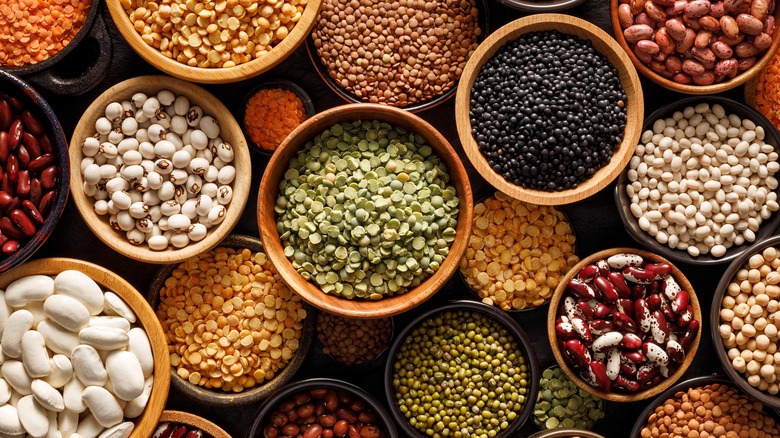Are Legumes Good For You?
Legumes are a staple in many dishes around the world, but they have recently become the topic of debate in certain circles, causing some to question whether or not they're actually good for your health — but what exactly are legumes and what does their nutritional content look like? As it turns out, legumes are a class of vegetables that come from the Fabaceae or Leguminosae plant family, which produce a pod with seeds inside of them. According to WebMD, these seeds are the edible parts of the plant and are often referred to as pulses.
These pulses can include beans, peas, lentils, chickpeas, soybeans, and peanuts, among others. Generally speaking, legumes are highly nutritious and considered to be a great source of protein and fiber. They're also rich in a variety of important vitamins and minerals (via Healthline). For instance, a 1-cup serving of cooked lentils contains 18 grams of protein, 16 grams of fiber, 90% of the recommended daily value (DV) of folate, 37% of the DV of iron, 17% of the DV of magnesium, and 16% of the DV of potassium.
Potential downsides of eating legumes
As a result, legumes are linked to a number of important potential health benefits. For instance, eating legumes on a regular basis can help support immune function, reduce low-density lipoprotein cholesterol, regulate blood pressure, promote microbiome diversity, and reduce the risk of cardiovascular disease (via MedicalNewsToday). Although legumes can certainly be part of a healthy and well-balanced diet, there are some potential drawbacks to eating them.
That's because legumes contain compounds known as antinutrients, which can prevent your body from absorbing some nutrients. However, this effect can be combated by limiting your daily intake of legumes or by soaking, cooking, and fermenting them before they're consumed. Some legumes, like beans, can also cause bloating and flatulence in some people. However, the U.S. Dry Bean Council says that soaking them before you eat them or making them a part of your weekly diet can help reduce the risk of digestive discomfort.


